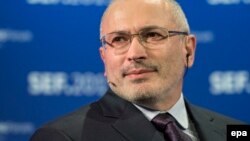Russia's media monitor moves to block websites of 'undesirable' organizations
| Publisher | Radio Free Europe/Radio Liberty |
| Publication Date | 12 December 2017 |
| Cite as | Radio Free Europe/Radio Liberty, Russia's media monitor moves to block websites of 'undesirable' organizations, 12 December 2017, available at: https://www.refworld.org/docid/5a9fc6b2a.html [accessed 6 June 2023] |
| Disclaimer | This is not a UNHCR publication. UNHCR is not responsible for, nor does it necessarily endorse, its content. Any views expressed are solely those of the author or publisher and do not necessarily reflect those of UNHCR, the United Nations or its Member States. |
Last Updated: December 12, 2017 16:49 GMT
RFE/RL's Russian Service
 Open Russia founder Mikhail Khodorkovsky served 10 years in prison after being convicted of charges widely seen as politically motivated.
Open Russia founder Mikhail Khodorkovsky served 10 years in prison after being convicted of charges widely seen as politically motivated.
Russia's Roskomnadzor media regulatory agency has begun blocking access to websites of organizations deemed "undesirable" by the Justice Ministry under a 2015 law aimed at restricting the activity of organizations the Kremlin accuses of fomenting political dissent.
The regulator's website on December 12 posted a notice that it had received a demand from the Prosecutor-General's Office to restrict access to Internet sites that "distribute information from organizations deemed undesirable in Russia."
It does not mention any organizations by name, but there are currently 11 organizations on the list.
On December 11, the authorities blocked access to several websites of Open Russia, a democracy and civil-society NGO founded by former oil tycoon Mikhail Khodorkovsky.
Open Russia reported that its main website, OpenRussia.org, and five others had been blacklisted by Roskomnadnzor for "calling for disorder."
The organization stressed that its Russia-based branch had not been included on the list of undesirable organizations.
On December 12, the popular social-media site Odnoklassniki began blocking Open Russia's group on its site.
Khodorkovsky the same day denounced the blocking of the websites as "an abuse of official power to benefit the rule of a criminal group."
Amnesty International also denounced the move, saying in a December 12 statement that Russian authorities "are clearly targeting Open Russia in a bid to suffocate dissent and pluralism in the Russian media and expunge Khodorkovsky's presence in Russian politics and society."
Once Russia's wealthiest tycoon, Khodorkovsky was arrested in 2003 and served 10 years in prison after being convicted of tax evasion and other financial crimes in two trials widely seen as politically motivated.
Khodorkovsky now lives in Western Europe after leaving Russia when he was pardoned by Putin and released from prison in 2013.
Blocking the websites is the latest in a series of moves by the Kremlin against Open Russia and Khodorkovsky-connected organizations.
In April, the Russian Justice Ministry listed three organizations associated with Khodorkovsky as "undesirable."
The ministry listed two branches of Open Russia registered in the United Kingdom, as well as the U.S.-based Institute of Modern Russia.
The Open Russia NGO registered in Russia, which operates the Openrussia.org website, was not listed. The Russian NGO also does not appear on the separate Justice Ministry list of Russian NGOs considered to be "foreign agents."
Police have searched the homes of the organization's employees in recent months, and two employees have been fined, according to rights groups.
The organization's deputy director, Ilya Novikov, fled the country in June, after what he said were "constant attempts by police to conduct searches" at his workplace.
Amnesty International said in its December 12 statement that following the move against the Britain-registered branches, "the Prosecutor's Office gave assurances that the ban wouldn't affect the activities of the Russian-based movement of the same name."
"Today's events now show that promise to be nothing more than a brazen lie. The authorities have shown their true intent to target and harass Open Russia out of existence," Denis Krivosheev, Amnesty International's Deputy Director for Europe and Central Asia said.
The moves against Open Russia come as the country heads toward a presidential election in March 2018.
President Vladimir Putin, who has ruled Russia either as prime minister or president since 2000, announced earlier this month that he will seek a fourth term. Because of the country's tightly controlled political environment and managed elections, analysts believe he is almost certain to be declared the winner.
Charismatic opposition leader and anticorruption activist Aleksei Navalny has been barred by the authorities from participating in the election because of a felony fraud conviction that he dismisses as politically motivated.
Other declared candidates include Communist Gennady Zyuganov, nationalist Vladimir Zhirinovsky, liberal Grigory Yavlinsky, business ombudsman Boris Titov, and television personality and journalist Ksenia Sobchak.
Link to original story on RFE/RL website
